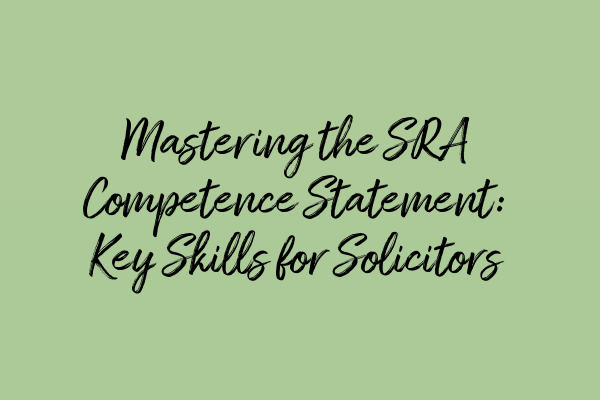Mastering the SRA Competence Statement: Key Skills for Solicitors
Welcome to Become Solicitor SRA, your go-to source for expert advice on mastering the SRA Competence Statement! As a solicitor, it’s crucial to stay updated and continually improve your skills to excel in your profession. In this blog post, we will delve into the key skills outlined in the SRA Competence Statement and provide useful insights on how to develop and master them. Whether you’re a seasoned solicitor or just starting your legal career, this article will equip you with the knowledge needed to thrive in the field.
Understanding the SRA Competence Statement
The Solicitors Regulation Authority (SRA) sets the standards and regulations for solicitors in England and Wales. The SRA Competence Statement is a fundamental document that outlines the skills and knowledge required for solicitors to practice law effectively and professionally.
Related Article: Private Prosecutions: Exploring Non-Governmental Prosecutions in Criminal Cases
The Competence Statement focuses on four key areas:
- Ethics, professionalism, and judgment
- Technical legal practice
- Working with other people
- Managing themselves and their own work
Each of these areas comprises specific skills and behaviors that solicitors must possess to deliver high-quality legal services. Let’s explore each of these areas in detail.
Ethics, Professionalism, and Judgment
As a solicitor, it is paramount to uphold the highest ethical standards and act ethically and professionally in all aspects of your work. This includes maintaining client confidentiality, avoiding conflicts of interest, and demonstrating sound judgment in legal matters.
To enhance your skills in this area, it is essential to stay updated with changes to the law and ethical considerations. Continuously keeping abreast of legal developments and participating in professional development activities will demonstrate your commitment to ethics and professionalism.
Technical Legal Practice
Technical legal practice encompasses the core legal skills and knowledge solicitors must possess to provide competent and effective legal advice. This includes legal research, written and oral communication, problem-solving, negotiation, and advocacy skills.
Related Article: Rights of the Accused: Protecting Individual Liberties in Criminal Proceedings
To excel in technical legal practice, it is crucial to continuously develop your legal research skills, refine your written and oral communication abilities, and engage in advocacy training. These skills will enable you to analyze complex legal issues, effectively communicate your arguments, and negotiate on behalf of your clients.
Working with Other People
Being able to work collaboratively and effectively with colleagues, clients, and other stakeholders is a vital skill for solicitors. It involves building relationships, managing client expectations, and effectively communicating in various contexts.
Related Article: Magistrates’ Court vs Crown Court: Understanding Key Differences
To enhance your ability to work with others, seek opportunities to develop your interpersonal and communication skills. Attend networking events, participate in team-building activities, and engage in active listening. These skills will enable you to establish rapport with clients, collaborate with colleagues, and manage challenging situations effectively.
Managing Themselves and Their Own Work
Lastly, solicitors must possess excellent organizational, time-management, and self-motivation skills to manage their own workload effectively. This includes the ability to prioritize tasks, meet deadlines, and adapt to changing circumstances.
Related Article: Protecting Vulnerable Witnesses in Criminal Trials: Best Practices and Legal Safeguards
Related Article: Unraveling the Complexities of UK Bail Laws
To improve your self-management skills, consider implementing time-management techniques, such as creating a schedule, setting realistic goals, and maintaining a healthy work-life balance. These skills will enable you to maximize your productivity, reduce stress, and deliver high-quality work consistently.
Conclusion
Mastering the skills outlined in the SRA Competence Statement is crucial for solicitors seeking to provide exceptional legal services. By focusing on ethics, professionalism, technical legal practice, working with others, and self-management, you can elevate your abilities and enhance your overall effectiveness as a solicitor.
Continuously developing and refining these skills will not only benefit your clients but also contribute to your professional growth and success. So, embrace this opportunity to become a well-rounded solicitor by mastering the key skills identified by the SRA Competence Statement!
Thank you for reading.


Leave a Reply